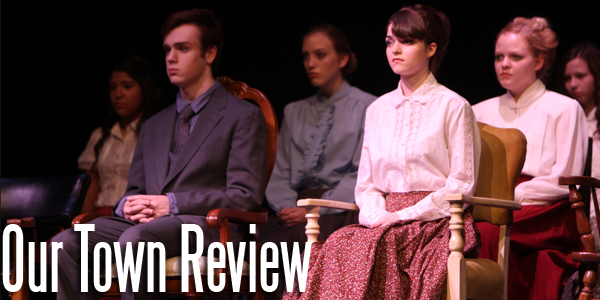
This past Thursday, Oct 18 marked the premier of LHS’s presentation of “Our Town,” a play set in 1901-1913 following the lives of two families and the changes their lives take. Aspects of love, youth, life and death are displayed in depth in a two hour time span separated into three parts by brief intermissions. However, “Our Town” lacked a vital and notable element: Jeremy Ferman’s exquisite set design.
“The scenic design was deliberate,” Mr. Ferman explains.
Wilder wrote “Our Town” purposely without a set or props, which explains why senior Sarah McDonell prepares a meal for her stage family out of thin air or why junior Madison Fountain snaps peas that exist only in the imagination of the cast and audience. Mr. Ferman remained true to the original play, using the umbrellas in Act III as the play’s only props.However, the lack of physical sets and props was nearly overlooked when the cast of both theater veterans and new-comers to the drama department took stage, both playing in equal depth and homage to Wilder’s classic play. From senior Wyatt Zalatoris’ portrayal of George Gibbs, the male lead, to freshman Catie William’s depiction of Emily Webb—the cast performed with vulnerability and momentarily shocking complexity. In the third act Williams’ stunning performance of her character’s afterlife notably affected the audience and even herself.
“I had to imagine how I would say those words as if it was my last goodbye,” Williams said. “Channeling those emotions wasn’t easy, but the sniffling and tears in the crowd let me know I was doing a good job.”
The Stage Managers are played by seniors Christina Cranshaw, Dini Wyatt and junior Marissa Flatt. They narrate “Our Town” and continuously interrupt scenes, reminding the audience that they are watching a play by providing background information on the fictional town Grover’s Corners, introducing characters and scene transitions.
The story in narration follows the lives of two families, the Gibbs and the Webbs, and the ephemeral milestones they experience. The audience watches Emily and George evolve from highschoolers into adults, fall in love, marry and have children of their own. In a shocking end, Emily passes away and joins Mrs. Gibbs and many others in a symbolic “grave,” a patch of stage lit eerily with rows of deceased characters staring morosely into the distance before them.
The cast created a conceptual and insightful performance, rising above the many cast changes and challenges they faced in the weeks before the premier weekend of “Our Town.” The material in the play was profound in nature, dealing with the many aspects of adulthood and the importance of enjoying and making the most out of every day we are afforded.















